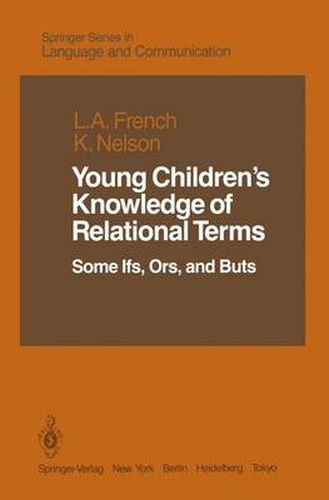Readings Newsletter
Become a Readings Member to make your shopping experience even easier.
Sign in or sign up for free!
You’re not far away from qualifying for FREE standard shipping within Australia
You’ve qualified for FREE standard shipping within Australia
The cart is loading…






This title is printed to order. This book may have been self-published. If so, we cannot guarantee the quality of the content. In the main most books will have gone through the editing process however some may not. We therefore suggest that you be aware of this before ordering this book. If in doubt check either the author or publisher’s details as we are unable to accept any returns unless they are faulty. Please contact us if you have any questions.
An appreciation of temporal and logical relationships is one of the essential and defining features of human cognition. A central question in developmental psy chology, and in the philosophical speculations out of which psychology evolved, has been how children come to understand temporal and logical relationships. For many recent investigators, this question has been translated into empiri cal studies of children’s acquisition of relational terms-words such as before, after, because, so, if, but, and or that permit the linguistic expression of logi cal relationships. In the mid 1970s, Katherine Nelson began to study young children’s knowledge about routine activities in which they participated. The goal of this research was to understand how children represented their personal experiences and how these representations contributed to further cognitive development. A primary method used in the early phases of this research involved simply asking children to describe familiar events. They were asked, for example, What happens when you have lunch at school? or What happens at a birthday party? Hundreds of transcripts of children’s responses to such questions were available when Lucia French became an NICHD Postdoctoral Fellow in Developmental Psychology at City University of New York in 1979.
$9.00 standard shipping within Australia
FREE standard shipping within Australia for orders over $100.00
Express & International shipping calculated at checkout
This title is printed to order. This book may have been self-published. If so, we cannot guarantee the quality of the content. In the main most books will have gone through the editing process however some may not. We therefore suggest that you be aware of this before ordering this book. If in doubt check either the author or publisher’s details as we are unable to accept any returns unless they are faulty. Please contact us if you have any questions.
An appreciation of temporal and logical relationships is one of the essential and defining features of human cognition. A central question in developmental psy chology, and in the philosophical speculations out of which psychology evolved, has been how children come to understand temporal and logical relationships. For many recent investigators, this question has been translated into empiri cal studies of children’s acquisition of relational terms-words such as before, after, because, so, if, but, and or that permit the linguistic expression of logi cal relationships. In the mid 1970s, Katherine Nelson began to study young children’s knowledge about routine activities in which they participated. The goal of this research was to understand how children represented their personal experiences and how these representations contributed to further cognitive development. A primary method used in the early phases of this research involved simply asking children to describe familiar events. They were asked, for example, What happens when you have lunch at school? or What happens at a birthday party? Hundreds of transcripts of children’s responses to such questions were available when Lucia French became an NICHD Postdoctoral Fellow in Developmental Psychology at City University of New York in 1979.